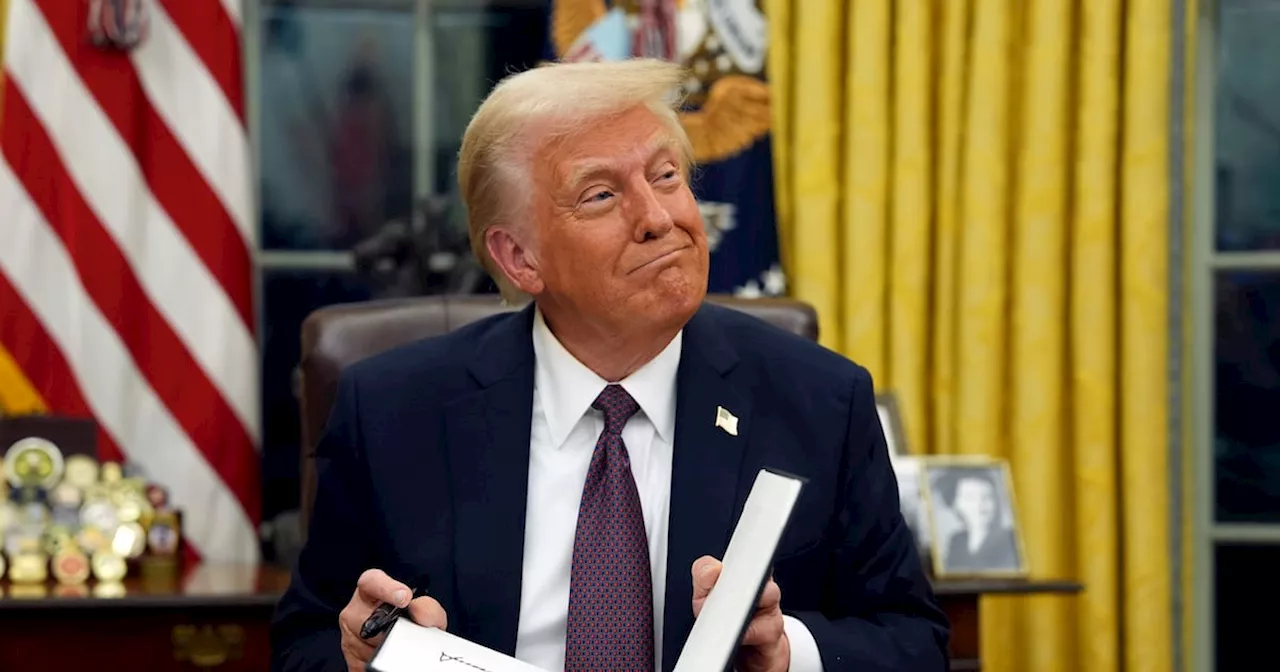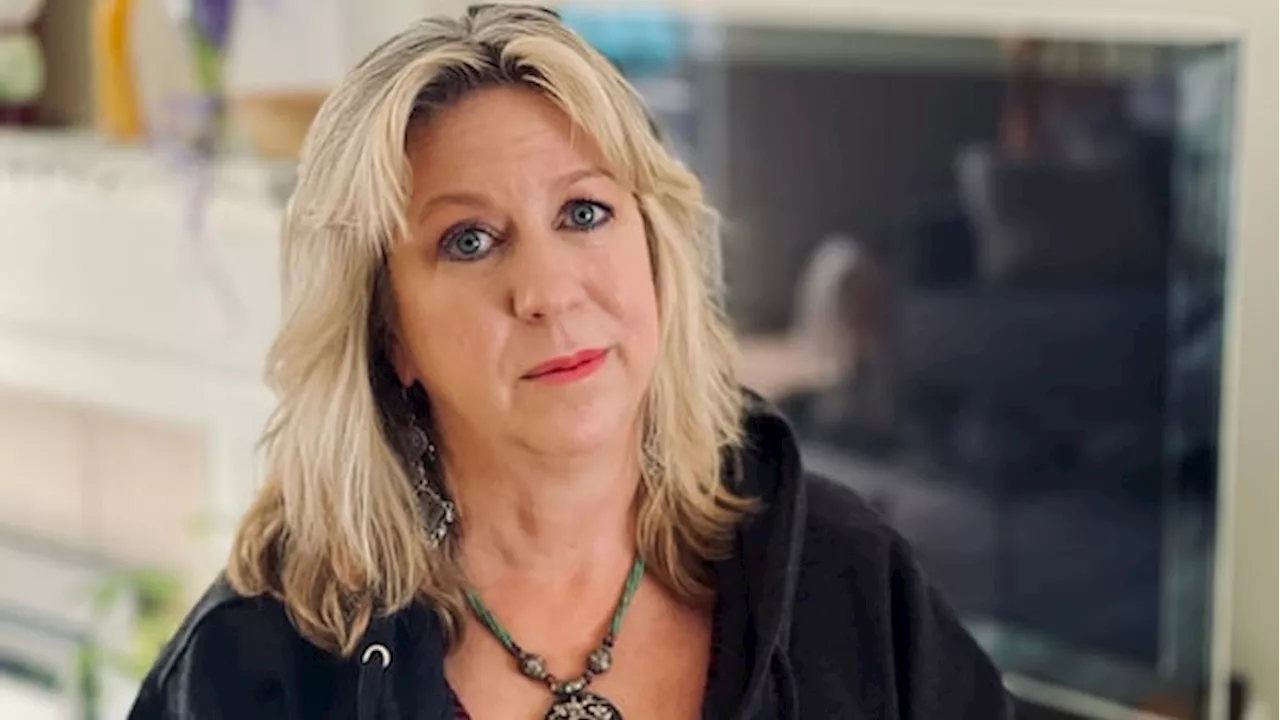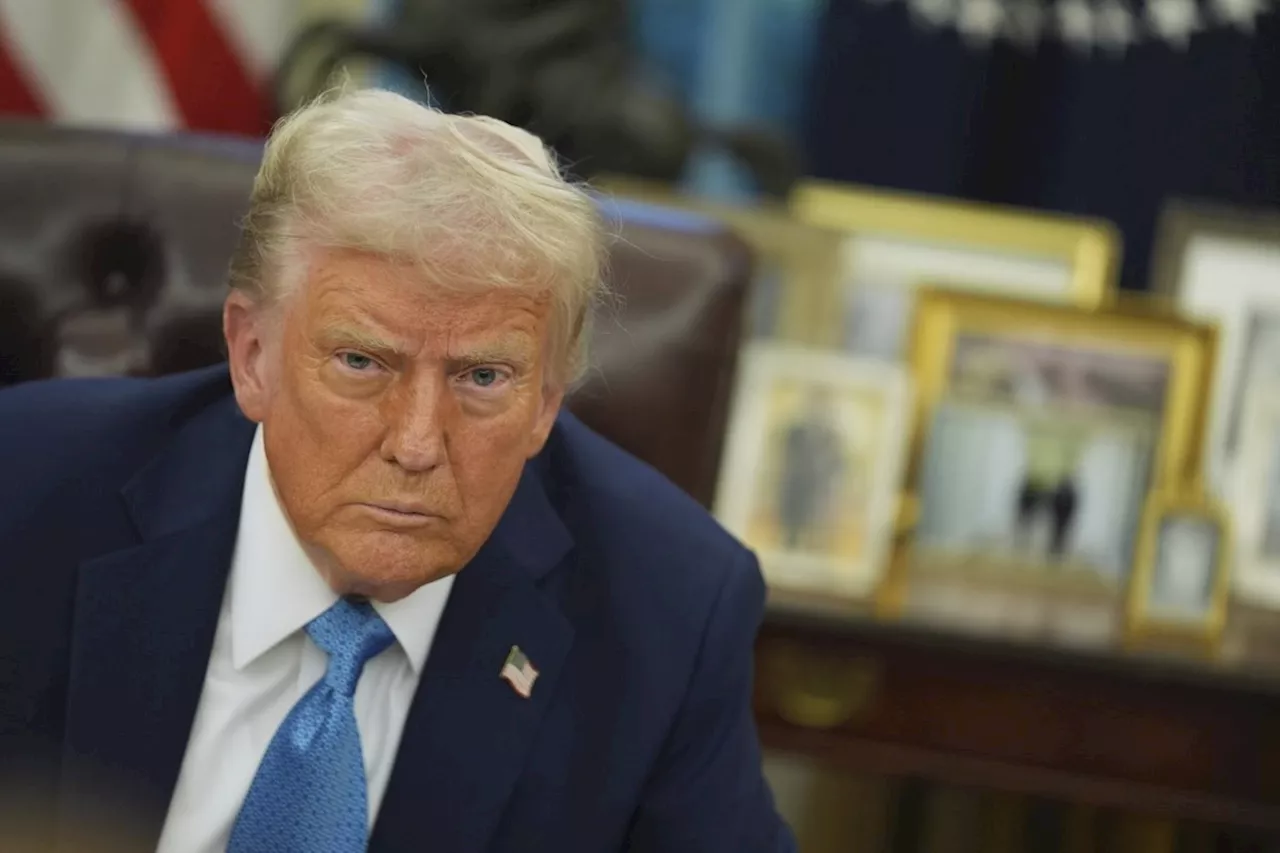President Trump's threat to impose tariffs on Canadian imports hangs over Ottawa as officials wait for his final decision. While Trump has indicated a willingness to reduce tariffs on Canadian oil to 10 percent, the White House confirms 25 percent levies on imports from both Canada and Mexico. Canadian ministers met with U.S. officials in a last-ditch effort to avert the tariffs, but Trump remains resolute, stating no concessions will prevent these duties. Canadian premiers are divided on how to respond, with some advocating for all options while others, like Alberta's Danielle Smith and Saskatchewan's Scott Moe, oppose retaliatory measures against oil and potash exports.
Canadian authorities are on edge, awaiting U.S. President Donald Trump 's decision on whether to impose punitive tariffs on Canadian imports today. Trump announced on Friday that he is considering reducing tariffs on Canadian oil to 10 percent, following the White House's confirmation that he will proceed with 25 percent levies on goods from both Canada and Mexico. Despite initially promising to implement these duties on his first day back in office, Trump refrained from doing so.
However, he reiterated his tariff threat, repeatedly hinting at a February 1st imposition. Foreign Affairs Minister Mélanie Joly, speaking from Washington D.C. on Friday evening, expressed uncertainty regarding the situation following Trump's recent statements. The federal government has prepared various retaliatory tariff options, ready to be deployed depending on Trump's final action. 'We have yet to see any clear decision-making or specific details coming from the White House,' Joly stated. Trump's explanation of his tariff plan during a Friday Oval Office press conference was vague. While addressing an unrelated question, he also suggested the possibility of oil tariffs taking effect on February 18th, leaving it unclear if this statement was connected to Canada.Throughout the week, Joly, Public Safety Minister David McGuinty, and Immigration Minister Marc Miller engaged in last-ditch efforts to avert the tariffs by meeting with Republican officials, including Trump's border czar Tom Homan, in the U.S. capital. The ministers presented Canada's $1.3-billion border security plan, aiming to alleviate Trump's concerns. They also emphasized the minimal volume of people and drugs illegally crossing the Canada-U.S. border, pointing out that the amount of drugs entering the United States from Canada is minuscule compared to those originating from Mexico and China. U.S. Customs and Border Protection data for the period between October 2023 and September 2024 reveals that officials confiscated 9,930 kilograms of fentanyl at American borders, with only 20 kilograms originating from Canada. However, it seems unlikely that strengthening border security would have swayed the president's stance. Trump asserted on Friday that no concessions would prevent Canada, Mexico, or China from facing these levies.Canadian premiers remain divided on the appropriate response if Trump follows through with his threats. While some advocate for considering all options, Alberta Premier Danielle Smith and Saskatchewan Premier Scott Moe insist that exports of oil and other resources like potash should be excluded from any retaliation plans. October saw the United States importing nearly 4.6 million barrels of oil daily from Canada, according to the Energy Information Administration. Moe and Smith, on Friday, expressed their anticipation of Trump's final decision. 'We would ask President Trump's administration to not put those tariffs on,' Moe stated. 'And we would also ask our federal government to address the priorities that President Trump has raised.'
Canada United States Donald Trump Tariffs Trade Border Security Oil Politics International Relations
Canada Latest News, Canada Headlines
Similar News:You can also read news stories similar to this one that we have collected from other news sources.
 Trump Threatens 25% Tariff on Canadian Goods, Ford Calls for Team Canada ResponseU.S. president-elect Donald Trump has threatened to impose a 25% tariff on Canadian goods upon his inauguration next week. Ontario Premier Doug Ford warns of potential job losses, urging federal government action. Ford advocates for a stronger energy partnership with the U.S. and emphasizes the need for a unified Canadian response.
Trump Threatens 25% Tariff on Canadian Goods, Ford Calls for Team Canada ResponseU.S. president-elect Donald Trump has threatened to impose a 25% tariff on Canadian goods upon his inauguration next week. Ontario Premier Doug Ford warns of potential job losses, urging federal government action. Ford advocates for a stronger energy partnership with the U.S. and emphasizes the need for a unified Canadian response.
Read more »
 Trump Threatens Canadian Tariffs, Could Declare National EmergencyUS President-elect Donald Trump may impose 25% tariffs on all Canadian goods, potentially declaring a national emergency to enact this threat.
Trump Threatens Canadian Tariffs, Could Declare National EmergencyUS President-elect Donald Trump may impose 25% tariffs on all Canadian goods, potentially declaring a national emergency to enact this threat.
Read more »
 Trump Threatens 25% Tariffs on Canadian and Mexican Goods, Sparking ConcernU.S. President Donald Trump has announced plans to impose a 25% tariff on all Canadian and Mexican goods beginning February 1st. This move has raised concerns among residents and businesses in both Canada and Mexico.
Trump Threatens 25% Tariffs on Canadian and Mexican Goods, Sparking ConcernU.S. President Donald Trump has announced plans to impose a 25% tariff on all Canadian and Mexican goods beginning February 1st. This move has raised concerns among residents and businesses in both Canada and Mexico.
Read more »
 Trump Threatens Tariffs on Canadian and Mexican Goods, Sparking Uncertainty for Alberta BusinessesPresident Trump's announcement of a 25 percent tariff on Canadian and Mexican goods has sent shockwaves through the Canadian business community, particularly in Alberta, which heavily relies on trade with the United States. The potential for tariffs could have significant economic consequences for Alberta businesses.
Trump Threatens Tariffs on Canadian and Mexican Goods, Sparking Uncertainty for Alberta BusinessesPresident Trump's announcement of a 25 percent tariff on Canadian and Mexican goods has sent shockwaves through the Canadian business community, particularly in Alberta, which heavily relies on trade with the United States. The potential for tariffs could have significant economic consequences for Alberta businesses.
Read more »
 Trump's NIH Funding Freeze Threatens Canadian ResearchUncertainty surrounding the U.S. President's pause on federal health spending raises alarm for Canadian scientists who rely on NIH funding for crucial research.
Trump's NIH Funding Freeze Threatens Canadian ResearchUncertainty surrounding the U.S. President's pause on federal health spending raises alarm for Canadian scientists who rely on NIH funding for crucial research.
Read more »
 Trump Hints at February Tariffs on Canadian Goods, While Canadian Politicians Back Away from Carbon PricingThis article covers several news stories from The Canadian Press. It starts with US President Donald Trump's suggestion of 25% tariffs on Canadian imports by February 1st, despite earlier indications of a study on trade practices. The article also discusses the three frontrunners in the Liberal leadership race shifting away from the Liberal government's carbon pricing policy. Other news covered includes Statistics Canada's upcoming release of December's inflation figures, thawing permafrost in the Arctic tundra, and a focus on the benefits of small care homes for long-term residents.
Trump Hints at February Tariffs on Canadian Goods, While Canadian Politicians Back Away from Carbon PricingThis article covers several news stories from The Canadian Press. It starts with US President Donald Trump's suggestion of 25% tariffs on Canadian imports by February 1st, despite earlier indications of a study on trade practices. The article also discusses the three frontrunners in the Liberal leadership race shifting away from the Liberal government's carbon pricing policy. Other news covered includes Statistics Canada's upcoming release of December's inflation figures, thawing permafrost in the Arctic tundra, and a focus on the benefits of small care homes for long-term residents.
Read more »
